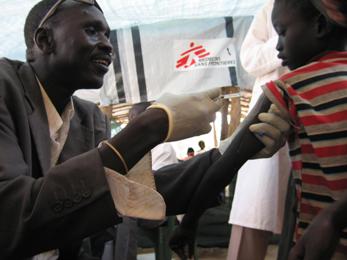Measles outbreak in Unity state triggers mass vaccination campaign
February 13, 2015 (BENTIU) – Médecins Sans Frontières (MSF) has reported 93 cases of measles in Yida refugee camp in South Sudan’s Unity state.

Fighting between the Sudanese army (SAF) and rebels from the Sudan People’s Liberation Movement/Army-North (SPLA-N/A) has recently intensified, forcing thousands of civilians to flee to Unity state.
Yida refugee camp is currently accommodating over 70,000 Sudanese civilians.
In a statement extended to Sudan Tribune on Friday, the medical charity said the cramped, overcrowded conditions at the camp had contributed to the outbreak of the disease, which is spread by exposure to fluids from the mouth or nose of an infected person.
The report indicated children under five years of age and pregnant women are most at risk of contracting the diseases due to their weakened immune system.
“In a refugee setting, one single case of measles is considered an outbreak,” said Ahmed Mohama Mahat, MSF’s vaccination coordinator in Yida.
“These people arriving in Yida from the Nuba Mountains are in very bad conditions; they have not been vaccinated for a long time,” he added.
A mass vaccination campaign has been launched by the International Rescue Committee (IRC) and the UN refugee agency (UNHCR).
According to MSF, the program is aiming to vaccinate 90 per cent of the children in the camps and nearby host communities between the ages of six months and 15 years old.
An estimated 35,000 children in total will be vaccinated over a five-day period.
MSF said the campaign will increase the immunisation coverage in the area, as well as
provide protection for people against future outbreaks.
“The challenge is to be able to achieve this rapidly in order to control an epidemic or the risk of epidemic,” said Mahat.
MSF says more than 100 people have been recruited from the camp’s population to assist with the campaign, bringing the total number of staff working on the ground to around 140.
Nine vaccination sites have been set up throughout Yida, each managed by teams of 12, including community health workers.
“The community health workers are very important for our work here and especially for the success of a mass vaccination campaign like this,” said Mahat.
“They are the eyes and ears of MSF in the community, and the link between the hospital and the community. They are well respected, so they are the force behind the community’s awareness of our facilities and of the vaccination campaign,” he added.
Faisa Said is just the sort of person the campaign is designed to aid.
She recently brought her two-year-old daughter, Nana Wii Said Kuku, to the MSF hospital in Yida with a high fever and the dry, wheezing cough typical of measles.
The infant had also developed a secondary pneumonia and a rash was starting to spread over her little body.
Said’s sister was also treated for measles at the hospital in recent weeks and has since made a full recovery. She hopes the outcome is the same for her daughter.
Disease is just one of many challenges facing her family, who first fled violence in the Nuba Mountains in 2012, returning home a year later when they thought it was safe.
When the fighting and bombing worsened once more, they were forced to flee to Yida again.
(ST)
